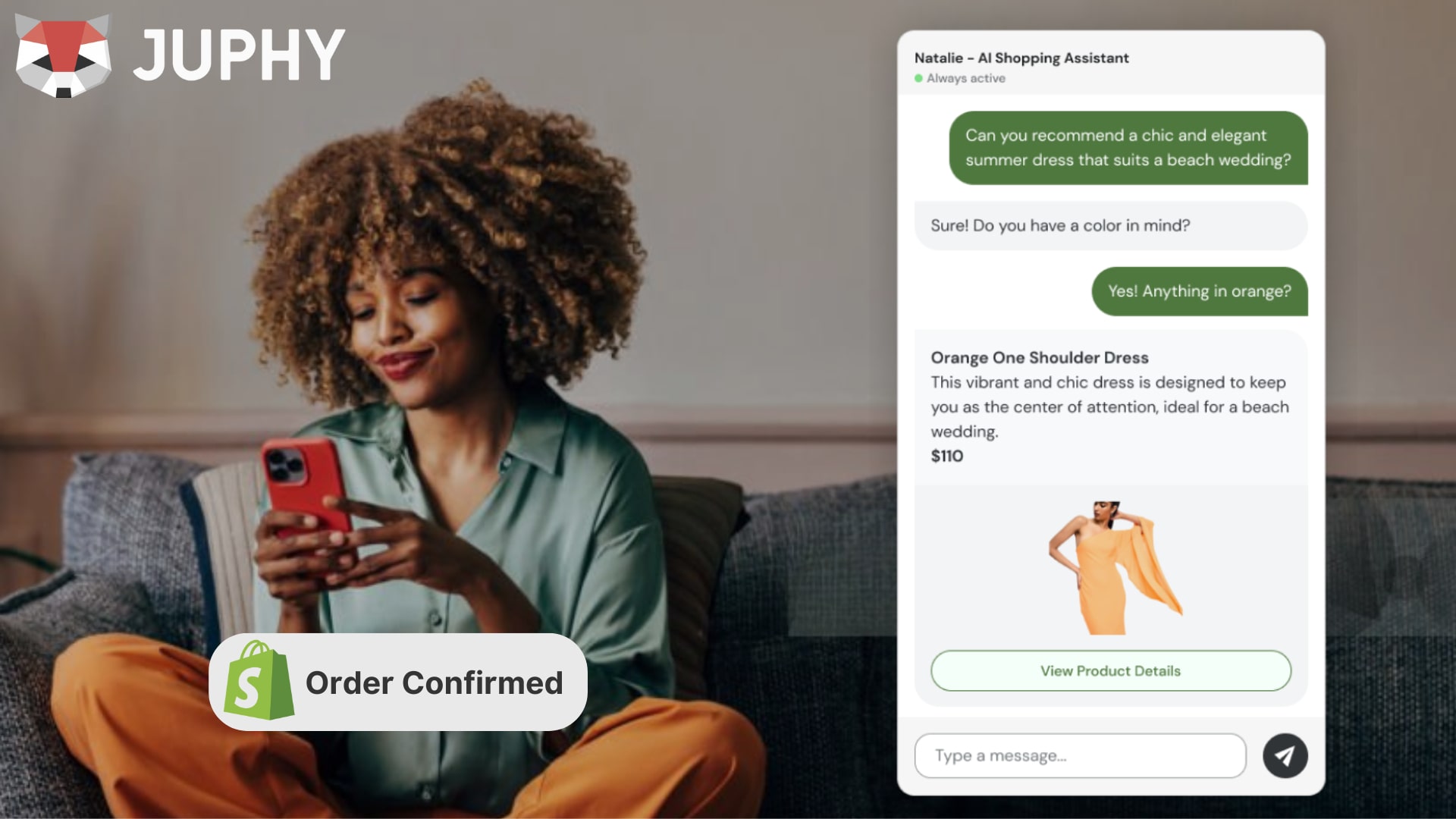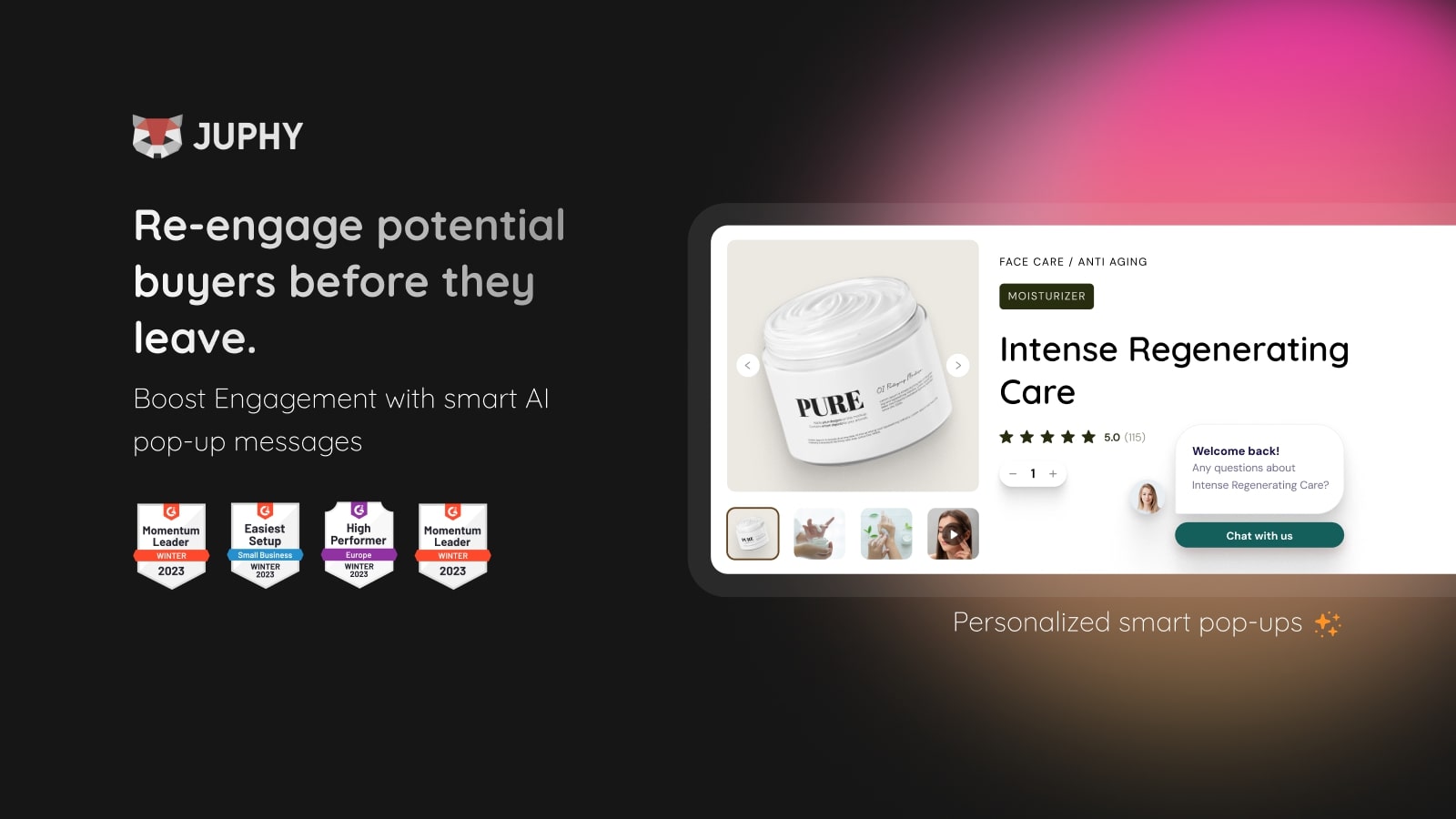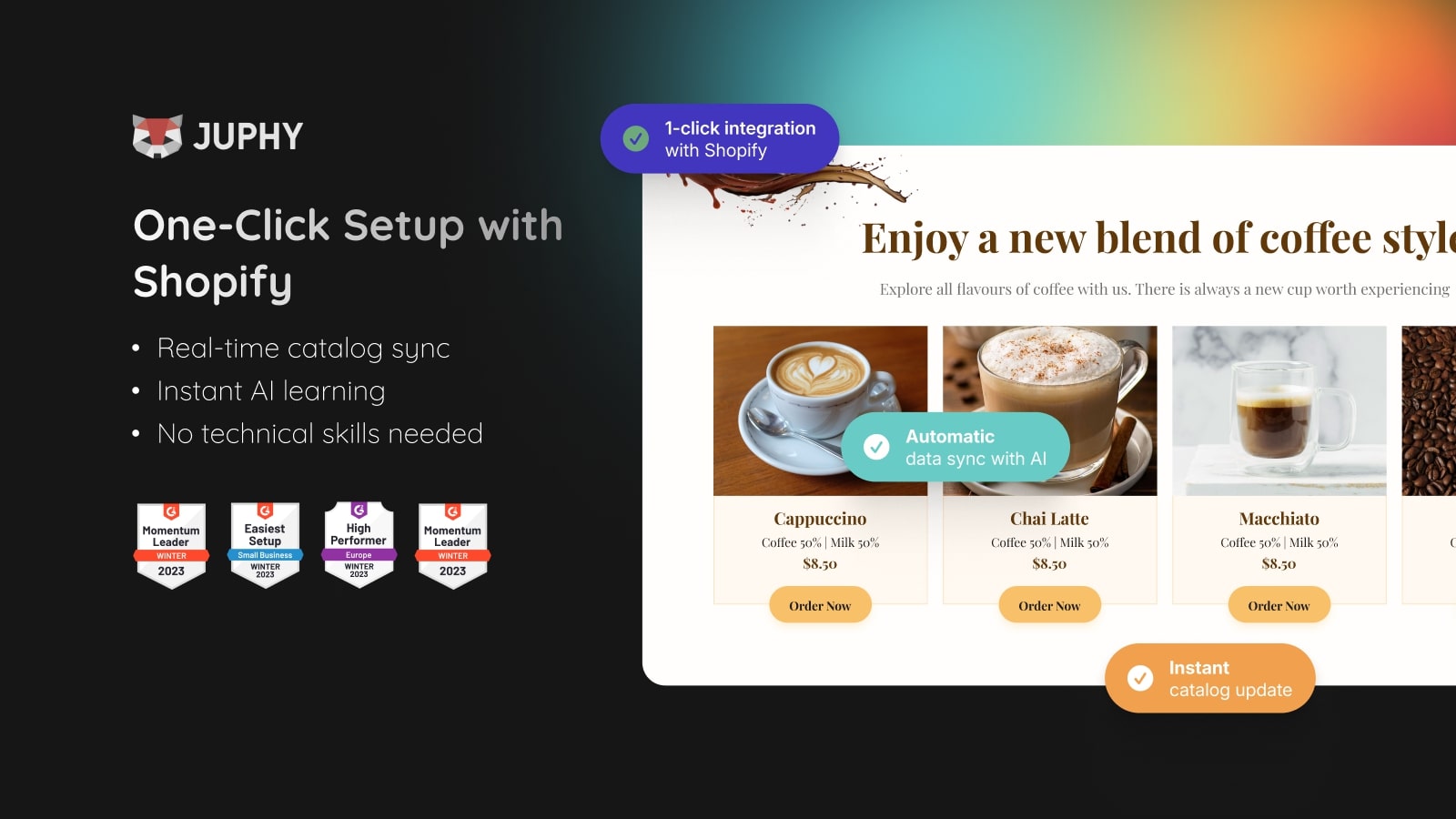Sales Popups and AI: How Juphy Transforms Passive Views into Active Engagements
Zeynep Avan
Not every sales popup leads to a sale… In the traditional approach, they just pop up and are often irrelevant, annoying, poorly designed or too many.
The relevance, design and quantity of sales pop-ups are the #1, #2 and #3 factors in their effectiveness. If a pop-up does not match the user’s interests or current browsing behaviour, it is likely to be ignored or closed immediately.
In this article, we will talk about the shortcomings of traditional sales pop-ups, their ineffectiveness in engaging customers and how AI is transforming e-commerce with well-developed pop-ups.
In particular, we will introduce Juphy’s AI-powered Sales Agent, which turns passive views that come with sales popups into active interactions by providing personalized, real-time interactions.

The Limitations of Traditional Sales Popups
Traditional sales popups come with several limitations in today’s world. E-commerce has changed a lot with the development of AI, data-driven sales strategies, and improved user experiences. Now, the old way of using popup strategies has become outdated.
Popups Can Be Annoying
In the traditional approach, we all know that when we visit a website, numerous popups can appear simultaneously. Even if there’s just one, it is often irrelevant and disrupts the user experience. This annoyance can lead to frustration and increased bounce rates, as users may leave the site without making a purchase.
For example, imagine visiting an online clothing store for the first time. As soon as the homepage loads, you’re greeted with a popup asking you to subscribe to the newsletter.
Before you can even close that, another popup appears, offering a 10% discount on your first purchase if you sign up for an account.
If that wasn’t enough, a third popup might then ask you to participate in a quick survey to improve the site.
Or think of it with only one popup. For instance, while reading a product description, a popup might suddenly appear, blocking your view and asking you to chat with a sales rep.
Either way, users often feel overwhelmed. Research has shown that intrusive popups push them away, resulting in lost sales opportunities, instead of engaging potential customers.
Negative sides:
- Disrupts user experience.
- Leads to frustration and increased bounce rates.
- Causes users to leave the site without making a purchase.
- Overwhelms users with multiple interruptions.
- Results in lost sales opportunities.
Limited Personalization
Traditional sales popups often suffer from limited personalization, displaying generic messages to all visitors regardless of their individual preferences or behaviours.
For example, a visitor browsing a tech gadget website might see the same popup offering a discount on fitness apparel as someone browsing a fashion site.
This one-size-fits-all approach fails to recognize the diverse interests and needs of different users.
Imagine you are looking for a new laptop on an e-commerce platform, and a popup appears, promoting a discount on kitchen appliances. This irrelevant message not only disrupts your shopping experience but also fails to address your current interest in electronics.
The lack of targeted content makes the popup ineffective, as it does not provide any value to you as a potential customer.
The result is that these generic popups do not engage users effectively. Without relevant and personalized content, users are less likely to respond positively to the popup.
Negative sides:
- Displays generic messages to all visitors.
- Fails to recognize diverse user interests and needs.
- Provides irrelevant content, disrupting the shopping experience.
- Reduces effectiveness due to lack of personalization.
- Decreases user engagement and response rates.
Popup Fatigue
Over time, users can develop popup fatigue, becoming desensitized to these repetitive interruptions and ignoring them entirely.
Popup fatigue occurs when users are bombarded with too many popups across various websites, leading to a general disregard for these messages.
For instance, think about your own browsing habits. If you encounter popups on nearly every website you visit, you might start closing them automatically without even reading the content.
This habitual dismissal is a clear sign of popup fatigue. Users become so accustomed to seeing these interruptions that they no longer pay attention to them, regardless of the message being conveyed.
The consequence of popup fatigue is a significant reduction in the effectiveness of these marketing tools.
When users ignore popups as a matter of course, the opportunity to engage and convert them is lost.
This desensitization can also contribute to a negative perception of the brand, as users associate the intrusive popups with a poor user experience.
Negative sides:
- Leads to desensitization and habitual dismissal of popups.
- Reduces the effectiveness of marketing efforts.
- Results in lost engagement and conversion opportunities.
- Contributes to a negative perception of the brand.
- Associates brand with a poor user experience.
The Evolution of AI in E-Commerce
E-commerce was revolutionary, but with AI it has become evolutionary. No one can say otherwise, different aspects of e-commerce have changed with the help of AI, and in-store interactions and sales pop-ups are no exception.
From Popups to Personal Assistants
E-commerce has drastically evolved with AI technology, no comment on this. Traditional static popups are being replaced by dynamic AI-powered assistants that engage users in meaningful interactions.
Instead of interrupting the browsing experience with irrelevant messages, these AI assistants offer a seamless and personalized approach to customer engagement.
Imagine visiting an online electronics store. Instead of a generic popup offering a random discount, an AI assistant greets you, understands your preferences based on your browsing history, and provides custom product recommendations.
If you’re interested in a new smartphone, the assistant might highlight the latest models, compare features, and even offer a special deal on accessories that complement your choice.
This shift from static popups to interactive AI assistants represents a significant leap forward.
These assistants can ask questions, understand user intent, and provide relevant suggestions in real-time, creating a more engaging and enjoyable shopping experience.
Benefits:
- Provides personalized and relevant interactions.
- Enhances user engagement with meaningful conversations.
- Improves the overall shopping experience by reducing interruptions.
Benefits of AI in Customer Engagement
AI technology is transforming the way businesses interact with their customers, bringing numerous benefits to customer engagement in e-commerce.
We divide them into 5 categories: availability, personalization, real-time, scalability and consistency.
- 24/7 availability:
AI-powered assistants are available all day, ensuring that customers can get assistance whenever they need it, regardless of time zones. This constant availability enhances customer satisfaction and ensures that no inquiry goes unanswered.
- Personalized recommendations:
Leveraging data from user behaviour and preferences, AI can provide personalized product recommendations. For example, if a customer frequently buys fitness gear, the AI assistant can suggest new arrivals in that category, increasing the likelihood of a purchase.
- Real-time support:
AI assistants can handle a wide range of customer queries in real-time, from providing product information to assisting with troubleshooting issues. This immediate support helps in resolving concerns swiftly, leading to a better customer experience and higher retention rates.
- Scalability:
Unlike human agents, AI can handle multiple interactions at the same time, making it highly scalable. This capability is particularly beneficial during peak shopping seasons or promotional events when customer inquiries surge.
- Consistency:
AI ensures consistent interactions, providing the same level of service and information to every customer. This consistency helps in building a reliable brand image and trust among customers.
Benefits:
- Ensures customer support is available 24/7.
- Provides personalized and relevant product recommendations.
- Offers real-time support for quick resolution of issues.
- Handles multiple customer interactions simultaneously.
- Delivers consistent and reliable customer service.
Introducing Juphy AI: Your AI-Powered Sales Agent
Understanding Juphy AI
Juphy’s AI Agent, featuring the ‘Built for Shopify’ badge, is transforming the way e-commerce businesses interact with their customers by replacing generic popups with intelligent, interactive assistants. Powered by ChatGPT, Juphy AI is designed to enhance the customer journey by offering personalized, real-time support and recommendations.

Key capabilities:
- Natural language processing: Understands and responds to customer queries in a conversational manner.
- Behavioural analysis: Monitors and analyzes customer behaviour and answers to provide relevant suggestions.
Seamless integration: Works effortlessly with various e-commerce platforms like Shopify to enhance the shopping experience.
Real-Time Customer Engagement
Juphy AI is excellent at engaging customers as they browse, offering real-time assistance that goes beyond static pop-ups.
Whether a customer needs help finding a product, has a question about a product, or needs support with a purchase, Juphy AI is there to provide immediate assistance.
How Juphy’s AI Agent engages customers:
- Instant responses: Answers customer questions on the spot, reducing wait times and frustration.
- Proactive recommendations: Suggests products based on browsing history and preferences, increasing the chances of a sale.
- Purchase assistance: Helps customers through the checkout process, ensuring a smooth and efficient transaction.
- Help assistance: Helps in product returns and return policies to never let a customer down.
Personalized Shopping Experience
Juphy AI creates its unique interactions with each customer, creating a shopping experience that feels unique and relevant.
Unlike traditional popups that deliver the same message to every visitor, Juphy’s AI Agent adapts its approach based on individual behavior and preferences.
Features of personalized interactions:
- Custom recommendations: Offers product suggestions that match the customer’s interests and past purchases.
- Behaviour-driven messages: Delivers messages and offers that are aligned with the customer’s browsing patterns.
- Enhanced engagement: Builds intimacy with customers by remembering previous interactions and preferences
Benefits of personalized shopping with Juphy AI:
- Increased conversion rates: Personalized interactions lead to higher engagement and more sales.
- Better customer satisfaction: Customers appreciate the custom approach, leading to greater satisfaction and loyalty.
Efficient customer support: Real-time, personalized assistance reduces the need for customer service intervention, streamlining the shopping process.
Why Juphy AI is Superior to Sales Popups
| Aspect | Traditional Popups | Juphy AI Sales Agent |
| Personalized Interactions | Display the same generic message to all visitors | Provide personalized interactions customized to each visitor’s actions |
| Relevance | Deliver one-size-fits-all messages | Analyze user data to provide relevant product recommendations |
| Engagement | Lead to low engagement and high bounce rates | Increase engagement and conversion rates with tailored suggestions |
| User Experience | Cannot improve user experience with customizations | Enhance the shopping experience with relevant and timely suggestions |
| Continuous Training | Remain static and do not evolve based on user interactions | Learn from new data to refine responses and recommendations |
| Accuracy | Cannot improve understanding of customer needs over time | Become more effective at addressing customer needs continuously |
| Adaptability | Cannot adapt to changing customer intent and market trends | Adapt to changes in customer behaviour and market trends |
| Integration | Require manual setup and adjustments, which are time-consuming and prone to errors | Integrate smoothly with popular e-commerce platforms like Shopify |
| Implementation | Often challenging to implement into existing systems | Quick and hassle-free integration with existing e-commerce platforms |
| Consistency | Inconsistent customer experience | Provide a unified and consistent customer experience across the website |
Personalized Interactions vs. Generic Messages
Traditional sales pop-ups often fail to create meaningful customer interaction due to their generic structure.
We talked about these in the previous parts, remember? These popups typically display the same message to all visitors. This one-size-fits-all approach can be off-putting and ineffective, leading to low engagement and high bounce rates.
In contrast, Juphy AI offers personalized interactions customized to each visitor’s unique actions.
Instead of showing the same message to everyone, Juphy’s AI Agent analyzes user data to provide relevant product recommendations and support.
For instance, if a user frequently browses fitness equipment, Juphy AI can suggest the latest workout gear and accessories that match their interests.
Key differences: relevance, engagement and user experience
- Relevance: Juphy AI customizes messages based on user actions, while traditional popups deliver generic messages.
- Engagement: Personalized interactions lead to higher engagement and conversion rates compared to generic, mass-sent popups.
- User experience: Juphy AI enhances the shopping experience by providing relevant and timely suggestions, unlike popups that are powerless to improve user experience with customizations.

Continuous Training and Improvement
One of the significant advantages of Juphy’s AI Agent over traditional sales popups is its ability to learn and improve continuously.
Traditional popups remain static and do not evolve based on user interactions, making them less effective over time.
Juphy AI, however, is designed to learn from each customer interaction.
By analyzing past interactions, Juphy AI can refine its responses and recommendations. Businesses can modify and train Juphy AI to better understand customer preferences, leading to more accurate and helpful interactions.
Benefits of continuous training:
- Improved accuracy: Juphy AI becomes more effective at understanding and addressing customer needs as time goes on.
- Enhanced user experience: Continuous learning ensures that interactions are always relevant and helpful, unlike sales pop-ups that cannot be updated.
- Adaptability: Juphy AI can adapt to changing customer intent and market trends, but traditional sales pop-ups cannot do so without a marketing team assessing the changes over a given time period.
Seamless Integration with E-Commerce Platforms
Integrating new technology into existing systems can often be challenging, but Juphy’s AI Agent is designed for easy integration with popular e-commerce platforms like Shopify.
This compatibility ensures that businesses can easily implement Juphy AI without changing their current operations.
Traditional popups often require manual setup and adjustments, which can be time-consuming and open to errors. Juphy AI, on the other hand, integrates smoothly with your e-commerce platform.
Advantages of seamless integration:
- Ease of implementation: Quick and hassle-free integration with existing e-commerce platforms.
- Consistency: Provides a unified and consistent customer experience across the website.
- Efficiency: Reduces the need for manual adjustments, saving time and resources.

Conclusion
Traditional sales popups are increasingly ineffective.
Their one-size-fits-all approach, lack of personalization, and intrusive nature often lead to frustrated users and missed sales opportunities.
In contrast, AI involvement in e-commerce, especially tools like Juphy’s AI Agent offers smarter, more engaging solutions.
By providing personalized, real-time interactions, Juphy AI enhances the shopping experience, increases customer engagement, and boosts conversion rates.
It continuously learns from each interaction, adapting to user actions and market trends, and integrates with popular e-commerce platforms, making implementation straightforward and efficient.
Key Takeaways
- Traditional popups are irrelevant, generic, and boring.
- AI in e-commerce has transformed in-store popups and chatbots.
- AI sales assistants have become increasingly popular.
- Juphy AI is a sales agent tool with the ‘Built for Shopify’ badge that can make product recommendations.
- Juphy AI offers personalized interactions tailored to each user’s actions.
- Juphy AI engages customers in real-time, providing instant support and assistance.
- Juphy AI continuously learns from customer interactions, refining and improving over time.
